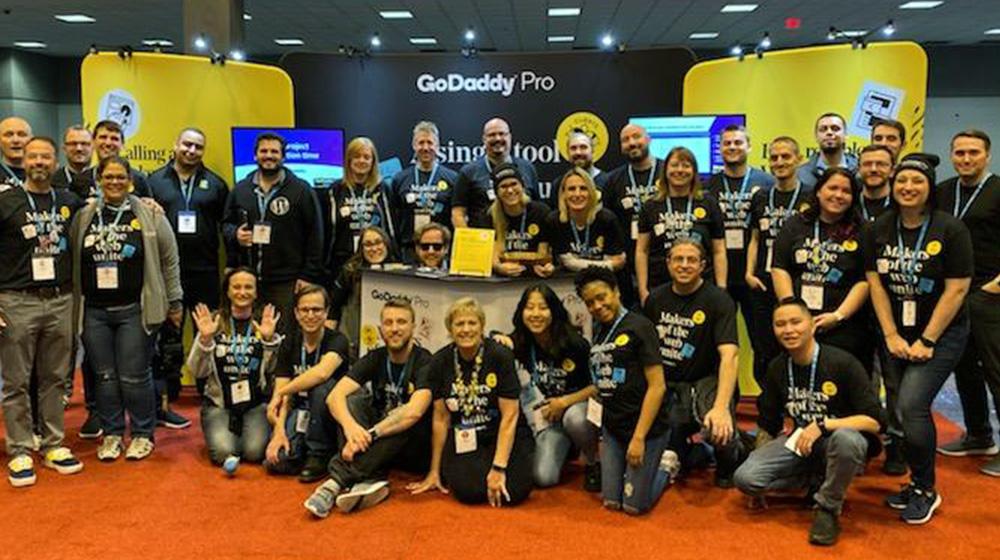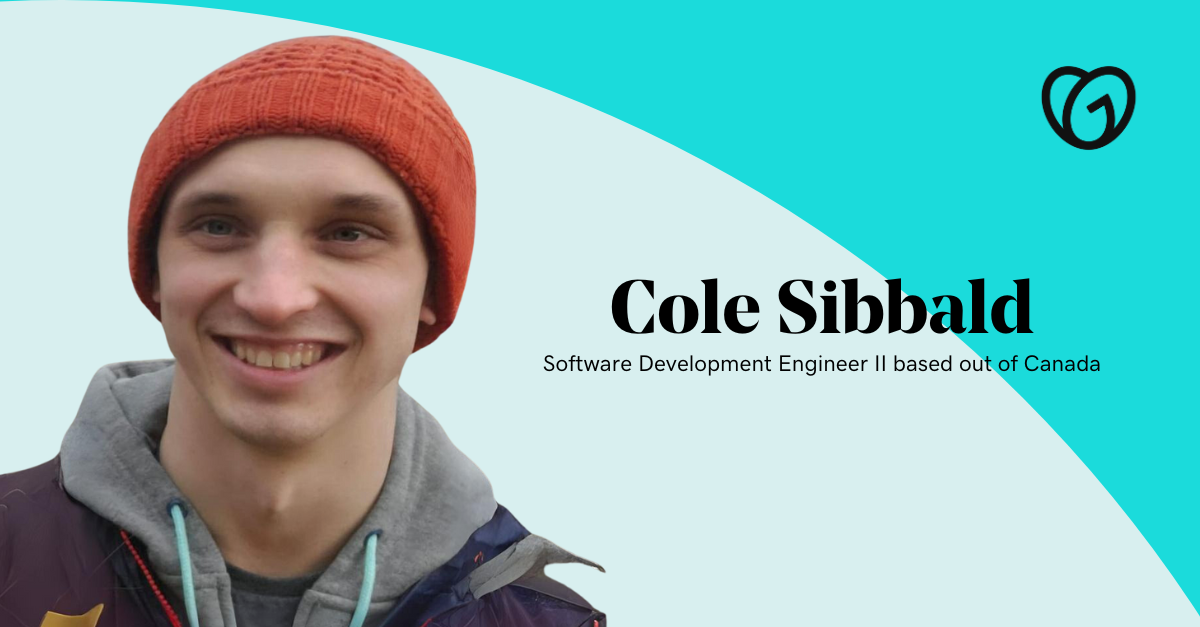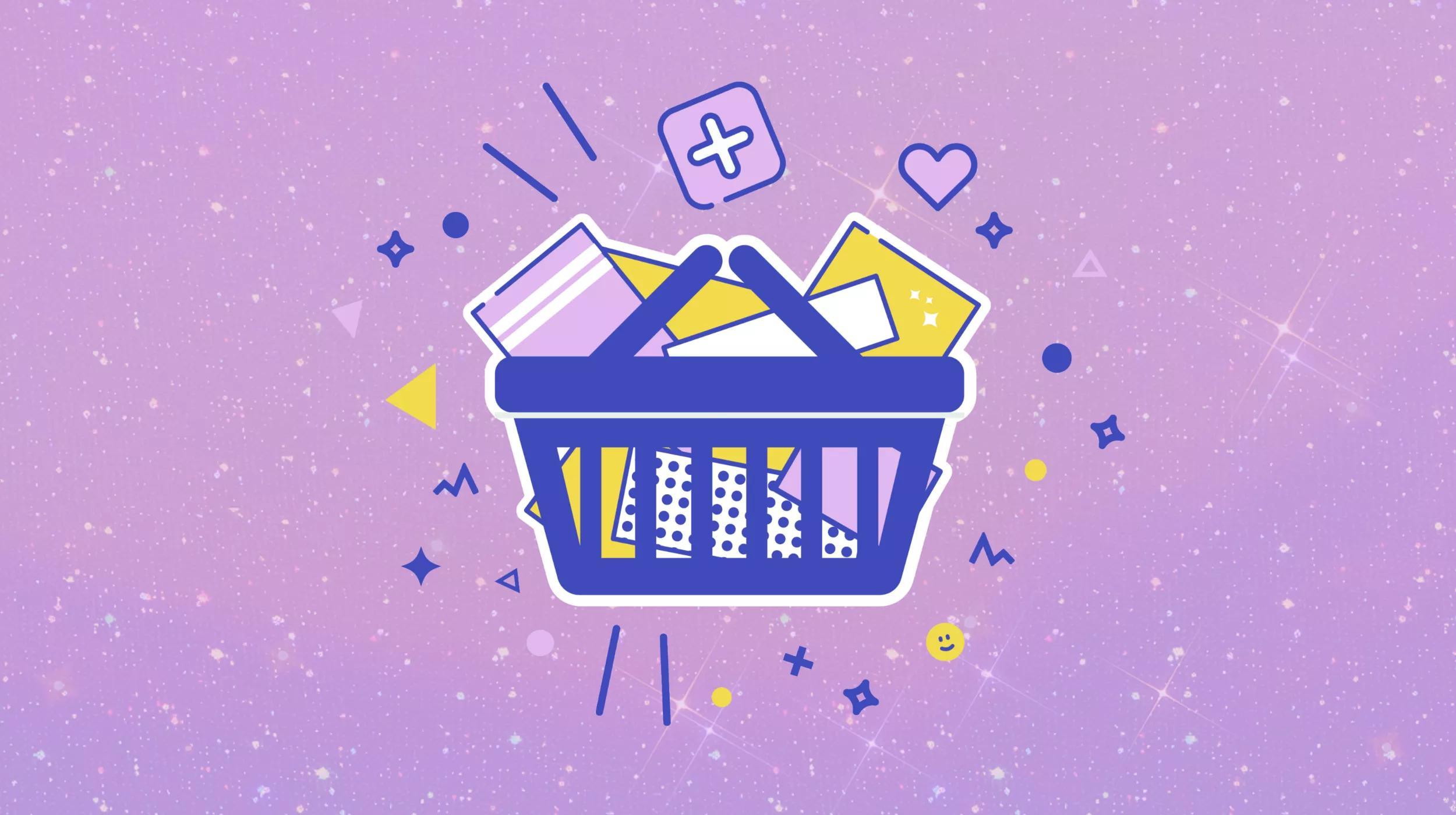We love WordCamp US. It's a rare chance to see our distributed community come together in one place, as folks trek in from around North America and beyond.
A big thanks to all of the organizers, speakers, and volunteers who poured their time and passion into making WordCamp US 2019 happen.
And thanks to everyone who stopped by our booth during the event. We're grateful for the time we got to spend with new people and familiar faces.
Here are some of our big takeaways from #WCUS 2019:
- WordCamp US isn’t your typical WordCamp
- The WordPress ecosystem is maturing
- Blocks are the future of WordPress
- New WordPress solutions from GoDaddy
- Contributing to the WordPress community
- Getting hands-on with workshops
- Selfies, selfies everywhere
- Makers Of The Web, Unite
WordCamp US isn’t your typical WordCamp
WordPress is growing up. What started as a side project for blogging became an operating system for the open web. Things are changing. WordCamp US is an example of that.
WCUS is a flagship event. The scope and scale is 10x what you’d expect at a local WordCamp. It’s bigger in every sense: a bigger venue, a bigger team, and a bigger budget.
That said, WCUS is still very much a WordCamp. The tickets are affordably priced, the venue is accessible, and you can watch the sessions through livestreams and WordPress.tv.
And, most importantly, it’s all handled by a team of volunteers. This includes the organizers, speakers, and day-of event volunteers.
You may not pick up on the volunteer aspect if this your first WordCamp, because #WCUS doesn’t feel like an informal event. The execution is polished and on par with an industry conference.
The speakers are fantastic. The rooms are full. The catering is superb. The “hallway track” is set up like a trade show. Sponsors throw parties and make announcements. And Matt Mullenweg’s annual State of the Word has a distinctly "tech keynote" vibe:
- Matt Mullenweg’s State of the Word, 2019 (Post Status)
- State of the Word 2019 Recap (WP Tavern)
- State of the Word 2019 (Matt Mullenweg)
Put all of that together and it feels something like a partner summit. Think Salesforce Dreamforce, Apple WWDC, Google I/O, Microsoft Connect, or Facebook F8.
The WordPress ecosystem is maturing
As the WordPress ecosystem continues to grow, expect to see more large technology companies appear in the community as they integrate with WordPress.
We saw some big names this weekend, including HubSpot, Google, and Amazon.
HubSpot was a major sponsor this year, but this isn’t their first dance with WordPress. Years ago, HubSpot created a little plugin called LeadIn. It added lightweight marketing automation to WordPress websites.
The plugin was eventually put on the backburner. But now they’ve revived it to deepen their integration between WordPress and their free HubSpot CRM.
Google was another major sponsor at WordCamp US. They had a few projects to show off: Google Site Kit, Newspack, AMP, and Native Lazyload.
The big one was Google Site Kit. It’s a WordPress plugin that connects a site to Google’s webmaster services like Tag Manager, Analytics, and Search Console.
Amazon Lightsail was on the ground in St. Louis, too. Their booth was next to ours, which seemed fitting, considering we partnered with Amazon Lightsail earlier this year to make our WordPress management tools available to all Lightsail users.
You can think of Lightsail as a lightweight intro to Amazon Web Services (AWS). If you’re building a site or a simple web application that won’t be resource intensive, AWS may be too much for needs. That’s where Lightsail fits in.
Blocks are the future of WordPress
Blocks are the future of WordPress. Now’s the time for developers to think about what that means for their new & existing products.
Gutenberg was like a stormcloud over WordCamp US 2018. The new block editor was on the cusp of shipping in WordPress 5.0. Some were concerned that Gutenberg was too disruptive and not ready for core. Others thought that Gutenberg was just a bad idea, full stop.
Despite the uncertainty, WordPress 5.0 “Bebo” dropped in December.
Now here we are, nearly a year later. The sky hasn’t fallen. We’ve been through two more WordPress releases, 5.1 “Betty” and 5.2 “Jaco”, that improved the editor even further.
WordPress 5.3 will be out soon, and it’ll include even more improvements. Features that were exclusive to the Gutenberg plugin will soon roll into the editor all at once. We’ll get new blocks, new APIs, new interactions, better performance, and improved code.
Aside: The block editor and Gutenberg plugin are different. The block editor is built into WordPress, while the Gutenberg plugin includes work-in-progress features. Think of it as a “preview” for what’s to come in the block editor.
All of this takes us one step closer to WordPress becoming an even more powerful website builder. Still on the roadmap: Full site customization; real-time collaboration; and complete multilingual support.
But for all of this to be successful, we need blocks. Lots of blocks. They’re the defining feature of our new WordPress experience.
There’s a growing selection of blocks in the WordPress plugin directory, but we still need more. This is a big opportunity for aspiring developers to get in early.
New WordPress solutions from GoDaddy
We launched new WordPress solutions that bring everything together in one place: domains, hosting, email, security, marketing, and support.
We’re big believers in the new block-based WordPress experience. That’s why Rich Tabor joined our team earlier this year. Rich created CoBlocks, one of the most popular block libraries for WordPress.
With CoBlocks as a starting point, we revisited the site building experience for our WordPress Hosting customers. That led to our new Go theme. Unveiled at WordCamp US, our Go theme combines blocks and CSS to create hundreds of professionally-designed site styles. (More to come on that soon.)
We also announced two new WordPress Hosting plans: Ultimate and Ecommerce.
Our Ultimate plan is a perfect choice for businesses, marketers, and WordPress power users. It includes free SSL encryption; Yoast SEO; enhanced security; and a free year of business email powered by Microsoft Office 365.
Our Ecommerce plan, powered by WooCommerce, is perfect for online stores. The setup process is 70% faster than on similar plans from other hosts.
It includes everything from our Ultimate plan, plus no transaction fees; unlimited products; bookings and appointment scheduling; real-time shipping rates; and free access to top premium WooCommerce extensions.
Check out our WordPress Hosting page for details and see how you can also get a free domain with an annual plan.
Online stores powered by WordPress
We’ll hear a lot more about commerce and privacy in the coming years. The two go hand-in-hand. Marketing sites were the first frontier. Online retail is the next.
Given our launch of WordPress Ecommerce Hosting, it seemed appropriate to sit in on a couple of sessions that felt particularly relevant to eCommerce — specifically, scaling online stores through eCommerce automation and the California Consumer Privacy Act.
eCommerce automation
First up: eCommerce automation with Beka Rice from SkyVerge and Jilt. This was a fantastic session packed with tons of insights for people who build/manage online stores. While many of Beka’s examples tied back to WooCommerce, they were largely platform agnostic.
Highlights:
- Automations are key for growth from $10k to $100k
- Focus on automating acquisition, retention/loyalty, internal processes
- Automate acquisition based on what you learn through
- Email automations are key for retention/loyalty - they build relationships
- Seek automations in product, order, and customer management processes
Check out the slides for more details.
California Consumer Privacy Act (CCPA)
Rian Kinney, who’s become an attorney-in-residence of sorts for the WordPress community, gave a fantastic overview of the California Consumer Privacy Act (CCPA). We learned that, like Europe’s GDPR, a lot of the buzz is speculation over implementation and enforcement.
The big takeaway for web designers & developers? Limit your liability. Make it clear in your contracts that your clients own their sites.
Tell your client what level you’re going to build to, but don’t let yourself be held liable for the legal language or failed due diligence. Your client should retain legal counsel for those details.
If you’re interested in contributing to privacy-related projects in WordPress, check out the Privacy component within the WordPress Core team.
Contributing to the WordPress community
WordPress is more than just software. It’s a community. It’s people coming together in support of open source software and democratizing publishing. We all benefit when we all contribute and participate.
WordPress is an open source software project. It’s created and supported by a global community of volunteers.
As a company that benefits from WordPress — we’re the largest WordPress hosting provider in the world — we have a responsibility to give back to the project.
That’s why we participate in Five For The Future. We have full-time contributors on our team, we release our themes and plugins under the GPL, and we support local WordCamps and WordPress meetups.
We’re not alone. We collaborate with other companies on the WordPress project, and catch up at events like WordCamp US. It’s a unique and wonderful trait of the WordPress community.
Getting hands-on through workshops
Hands-on workshops are a great way for new WordPress users to get started, for existing users to level up their skills, and for experienced users to share their knowledge.
Workshops are a new addition to WordCamp US. Our team was involved with three: Creating a Welcoming and Diverse Space; The Building Blocks of Building Blocks; and Grow Your Meetup.
The Creating a Welcoming and Diverse Space workshop helped community organizers, like those who lead WordPress meetups, improve the diversity and inclusivity of their groups. It was led by Allie Nimmons, Aurooba Ahmed, David Wolfpaw, and Jill Binder.
The Building Blocks of Building Blocks workshop was a hands-on introduction to the new WordPress block editor API. Participants spun up a local development environment and created a custom block. The workshop was led by our colleague Rich Tabor.
The Grow Your Meetup workshop brought WordPress meetup organizers together to share common challenges and brainstorm on ideas for managing their group. It was led by Victor Ramirez, Meagan Hanes, and Andy McIlwain (yours truly).
We hope that the Community Track will make a return at the next WordCamp US, and hopefully other local WordCamps consider running similar workshops of their own.
Special thanks to David Bisset for leading the charge on the Community track and workshops.
Selfies… selfies everywhere
The WordPress community is a distributed one, so big events like WCUS are a rare opportunity to catch up with friends from abroad. And what better way to capture the moment than with a selfie?
The most prolific of selfie-takers at WCUS had to be Allie Nimmons, one of our GoDaddy Pro ambassadors. Allie was on a mission to take 100 selfies with other attendees - and she did it!
We instigated some selfie-taking with a contest to win an iPhone 11 Pro. The rules were simple: Attendees had to snap a selfie at our booth and tag us. Alternatively, they could grab one of our collectible Wapuu pins, find someone else with a pin, and snap a group selfie to enter.
Congrats to Jonya, our giveaway winner! We hope your new iPhone captures many happy memories.
Did we take your photo? Check out our WCUS 2019 gallery!
Makers Of The Web, Unite
The Makers Of The Web build websites for others. We share a common purpose: helping people create and grow their online presence. In 2020, we’ll do more to bring this global community of Makers together, online and offline.
Makers Of The Web, Unite. We plastered this proclamation across our booth, swag, tweets, and Insta posts.
But what is it all about? Who is a “Maker Of The Web”?
A Maker Of The Web is someone who builds websites for others. You don’t need to be a coder. You don’t need to do it full time. If you build sites for other people, you’re a Maker Of The Web.
We want to bring the Makers Of The Web together, online and offline. So, starting in 2020, our Makers Of The Web community program will:
- Support and promote local community groups
- Sponsor local groups to help cover their expenses, like venue booking & food
- Lead by example, as we start a new series of local groups for Makers Of The Web
We’ll have more to share soon.
In the meantime, if you’re already hosting local group events, let us know. Share your event with us. If accepted, we’ll promote it on our community events calendar and through other channels.
Brought to you by GoDaddy Pro
All of this is made possible thanks to GoDaddy Pro, our free partner program for web designers & developers. It includes site management tools, secure access to your clients’ GoDaddy accounts, and exclusive member benefits.
If you’re building websites for others, give it a try: join GoDaddy Pro.






